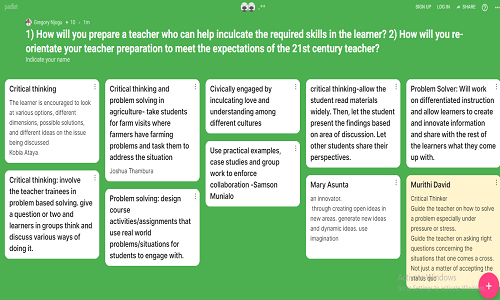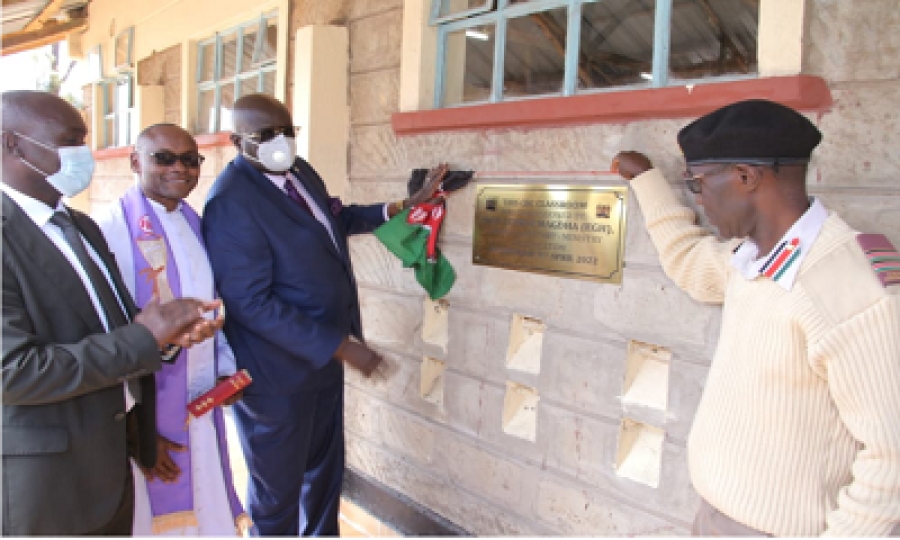The ABC of CBC: What’s New?
George Kiruja and Thuo Karanja
 The three letters, CBC could be the most spoken of in the education sector in Kenya today. They evoke different reactions and emotions depending on whom one is conversing with. While to some, a Competency-Based Curriculum (CBC) is the greatest thing that could have ever happened in the education sector, to others, CBC is an unwelcome disruption and nuisance to the continuity of learning. In simple terms, the Kenyan Competency-based Curriculum (CBC) is a new education system designed to develop skills and knowledge (competencies) and apply those competencies to problem-solving in real-life situations/ enable the learner to cope with life challenges. The Vision for a Competency-based Curriculum is to have Engaged, Empowered, and Ethical Citizens, while the Mission is to Nurture Every Learner's Potential. CBC was launched by the Ministry of Education and rolled out in primary schools in 2017. The pioneers of CBC, who are currently in Grade 6, will transit to Junior Secondary School (JSS) Grade 7 in 2023.
The three letters, CBC could be the most spoken of in the education sector in Kenya today. They evoke different reactions and emotions depending on whom one is conversing with. While to some, a Competency-Based Curriculum (CBC) is the greatest thing that could have ever happened in the education sector, to others, CBC is an unwelcome disruption and nuisance to the continuity of learning. In simple terms, the Kenyan Competency-based Curriculum (CBC) is a new education system designed to develop skills and knowledge (competencies) and apply those competencies to problem-solving in real-life situations/ enable the learner to cope with life challenges. The Vision for a Competency-based Curriculum is to have Engaged, Empowered, and Ethical Citizens, while the Mission is to Nurture Every Learner's Potential. CBC was launched by the Ministry of Education and rolled out in primary schools in 2017. The pioneers of CBC, who are currently in Grade 6, will transit to Junior Secondary School (JSS) Grade 7 in 2023.
Significant and notable in the shift to CBC include the change in learning years from the 8-4-4 to 2-6-6-3. The levels are referenced as 'Grades' instead of the previous use of 'Standard' and 'Form'. The syllabus is referred to as 'Curriculum Designs'. Though not easy to understand and use in the initial stages, the designs seem to have details and clarity that make lesson implementation easy. In CBC Designs, topics and subtopics are referred to as 'strands and 'sub-strands', respectively. Lesson objectives are learning outcomes, and learner activities are learning experiences. There are a few new introductions, such as using a 'key inquiry question' signifying an orientation to teaching that focuses more on inquiry-based learning. Another change in CBC is lessons that focus on developing competencies and values. The seven core competencies include communication and collaboration, critical thinking and problem-solving, imagination and creativity, citizenship, learning to learn, self-efficacy, and digital literacy. Values of love, responsibility, respect, unity, peace, patriotism and integrity are to be integrated into lessons. While planning lessons, teachers are expected to mainstream at least one competency and one value.
Assessment is another essential aspect of the CBC curriculum. Emphasis is on the ability of every learner to demonstrate learning or competencies as opposed to the hitherto right or wrong approach to assessment. In CBC, learners are assessed along a continuum of personal capabilities, with feedback forming a more significant part of the assessment.
A learner can demonstrate learning by exceeding or performing below the assessor's expectations. Using rubrics in assessment enables a teacher to map out effective feedback related to the individual learner or a group of learners.
Other features of CBC include a greater emphasis on parental involvement in the business of their children's education. The design is such that learners collaborate with their parents to produce learning artefacts and portfolios via extended learning activities.
The success of CBC is hinged on the sensitization, awareness creation, and training of key stakeholders in the education subsector (parents, school leaders and teachers) on this transition's implications and its implementation dynamics. Parents are eager to know the role government expects them to play to facilitate meaningful learning experiences for their children at school. Teachers are keen to see the structure of CBC and especially the anticipated changes in the processes of planning and implementing instruction. School leaders are eager to understand how they must restructure school programmes and practices to accommodate CBC.
As a critical stakeholder in the capacity development ecosystem in the education subsector, CEMASTEA has reoriented its training programmes to focus on CBC. The training for STEM teachers and school leaders is heavy on content related to CBC. We have trained teachers on the structure of the CBC Framework and Curriculum Designs interpretation, basics of lesson planning and implementation of CBC lessons and Competency-Based Assessment (CBA). The success of CEMASTEA CBC training is hinged on the multisectoral approach in training material preparation and training. The contextualization of the training to focus on the specific needs of participants and the strategy of having input from the experts in CBCs' key outcome areas has resulted in top-rated practical training for CEMASTEA's CBC training programmes. CEMASTEA collaborates with institutions such as the Kenya Institute of Special Education (KISE), Kenya Institute of Curriculum Design and Kenya National Examination Council (KNEC).
Latest from Esther Nyambura
- CEMASTEA Hosts Successful INSET Centre Principals’ Workshop
- CEMASTEA Conducts Successful Holistic Learning Training for Rwandan Teachers
- Empowering Quality Standards and Assurance Officers (QASOs) for Enhanced STEM Education
- Science and Mathematics Teachers Pilot Symposium: Innovative Classroom Practices
- CEMASTEA Strategic Plan 2023 – 2027: Key Highlights

